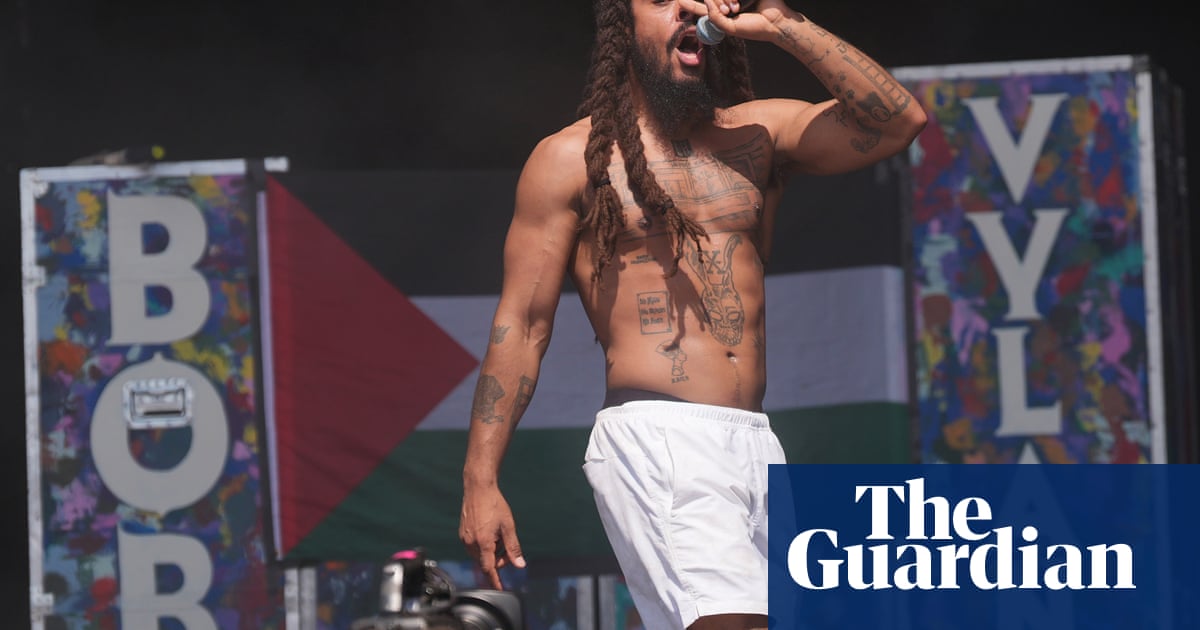TheBBChas said it regrets livestreaming a Glastonbury performance by the punk-rap duo Bob Vylan on Saturday, with the prime minister and Ofcom among those to weigh in on the incident.
So what happened with the broadcast? And as the corporation’s long-term critics circle, could there be further repercussions for it?
In the run-up to Glastonbury, the BBC was under pressure over how it would treat the performance by the Irish-language rap group Kneecap, since one of the band had been charged with a terrorism offence.
But it was an act that appeared on the same West Holts stage before that has left theBBC expressing regret over its editorial decisions. Pascal Robinson-Foster – of the punk-rap duo Bob Vylan – led chants of “Death, death to the IDF [Israel Defense Forces]”. He also told a story about working for a “fucking Zionist” and delivered thecontroversial“from the river to the sea” slogan.
The performance, which was available live via the iPlayer rather than shown on linear television, had a warning message about discriminatory language but was shown in full. It cannot be watched on-demand.
After the broadcast, the BBC initially stated “some of the comments made during Bob Vylan’s set were deeply offensive”. It pointed to the warning it had issued to viewers of “very strong and discriminatory language”. The organisers of Glastonbury also issued a statement stating they were “appalled by the statements” made on stage that “very much crossed a line”.
With Keir Starmer and otherpolitical figures taking aimat the BBC over the decision not to pull the broadcast, the corporation published a new statement on Monday. It said it regretted not ending the live stream during the performance. It said its team had been dealing with a “live situation” and accused Bob Vylan of expressing “antisemitic sentiments”. The Guardian has contacted a representative for the band about that claim.
The BBC’s statement came after the media regulator Ofcom also spoke out, stating the corporation “clearly has questions to answer”. It spoke to BBC executives over what producers were in place to ensure live coverage did not breach its own editorial guidelines. Under the current system of regulation, BBC issues are first looked at by the broadcaster itself before being escalated to Ofcom, other than in exceptional circumstances. In effect, Ofcom’s announcement heaped further pressure on the BBC.
The BBC has already said it is examining whether it needs to change its guidance in how it handles live broadcasts. Some industry figures believe that given the publicity around the Kneecap performance, a senior editorial figure should have been overseeing decisions on when to cut broadcasts – and that may be one of the outcomes. What due diligence was carried out on the band before the broadcast is another question being asked.
The issue has already led to questions in parliament, with an urgent question answered by the culture secretary, Lisa Nandy, on Monday. Parliamentary select committee hearings will no doubt follow with BBC executives. Chris Philp, the shadow home secretary, even called on police to “investigate and prosecute” the BBC.
It comes with the BBC already facingclaims of both anti-Israeli and anti-Palestinian bias. It is soon to publish an investigation into a Gaza documentary after it emerged its child narrator was the son of a Hamas official. Meanwhile, it has faced criticism for opting not to air a second documentary about medics in Gaza, citing partiality concerns, that will now be broadcast by Channel 4.
